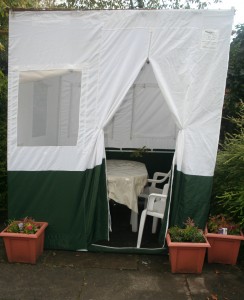Yesterday the Israeli navy intercepted two yachts trying to break the naval blockade of Gaza.
This blockade has been declared legal by the Palmer Report into the Mavi Marmara incident last year when IDF soldiers killed 9 Turkish ‘activists’ leading a convoy to bring aid to the Gaza Strip.
The two yachts were the rump of a second flotilla which tried unsuccessfully to sail from Greece earlier this year.
This time they decided to sail from Turkey.
As often happens with the BBC website, it is constantly updating its stories as events unfold.
The IDF spokesperson on Twitter Avital Leibovich created the hashtag #provocatilla and those who supported this flagrant attempt to break international law used the hashtag #freedomwaves.
Of course, those aboard the flotilla, mainly Americans and journalists, apparently, have a right to protest and even challenge international law. As long as they realise that they will have to take the consequences if they break it.
These same people are the first to condemn Israel if they are judged to have broken international law. So this was an exercise in hypocrisy. It was also a stunt which was dangerous as their boats struggled in rough seas.
There was a huge irony when the Israelis offered them medical assistance if required. I tweeted that the Israelis were “… offering humanitarian aid to those carrying ‘humanitarian aid’ ” in the full knowledge, unlike the BBC, that the boats carried no such thing.
In fact, when asked what they were carrying by the IDF, the activists told them that they were not carrying anything. So no aid. Yet this seems to have been lost on the BBC journos who characterised this as an aid flotilla thwarted by those dastardly Israelis who will stop at nothing to prevent the beleaguered Gazans from receiving that aid.
This is the first headline the BBC carried:
4 November 2011 Last updated at 14:23
Israel blocks protest boats trying to get to Gaza
Ok, so far not so bad. They were, indeed, protest boats.
The Israeli navy has intercepted and boarded two boats which were trying to break the blockade of the Gaza Strip.
Exactly right.
The Irish Saoirse (Gaelic for freedom) and the Canadian Tahrir (Arabic for liberation) were travelling about 50 nautical miles from the shore when they were contacted by the Israeli navy and told to turn back, the flotilla organisers told the AFP news agency.
The navy said it “advised the vessels that they may turn back at any point, thereby not breaking the maritime security blockade” or could sail to Ashdod port in Israel or to Egypt.
“The activists refused to co-operate,” AFP quoted the navy as saying.
Nothing about the fact that the blockade is deemed legal by the UN Palmer report but illegal by other UN bodies who do not know or wish to understand international law.
There is also an interesting mention of Turkey not sending warships to accompany these boats. Could it be that the Turks were quietly taken to one side by the Americans? Or is it they already knew that no aid whatsoever was being carried on these boats?
No mention in this article that hundreds of trucks pass everyday from Israel into Gaza (1500 this week, in fact) to feed their enemy and its captive population and to deliver medical supplies.
Then, a few hours later the headline changed to this:
Israel boards protest boats taking medical aid to Gaza
Wha!!? What ‘medical aid’? Did they not hear what I heard that there was nothing on these boats except some tins of tuna?
Immediately the headline conjures up an image of bad guys, the Israelis, stopping good guys, Gazans, from receiving medical aid – and it’s a complete lie which is still not corrected.
But it’s worse than that: the Israelis offered to escort the boats to Ashdod and, after inspection, take the aid through its regular crossing points.
Yet it still says in plain text:
They were carrying medical supplies for the coastal enclave.
Read it here.
And still no mention of the daily convoys crossing into Gaza.
You would never guess that Israel was supplying vast quantities of aid daily and that the activists had no intention of bringing anything to Gaza but themselves in an act of self-righteous self-promotion that brings peace not one iota closer.
So what image would you display to illustrate this article? A line of trucks entering Gaza from Israel? The flotilla boats? Their empty hulls? No, it was this:

People in the West Bank have staged protests in support of the Gaza flotilla
Again, the support for the flotilla is highlighted when there were apparently a mere handful of people there.
You would think that staging protests would mean a significant number. It’s another misrepresentation of facts.
So much for egregious reporting of the provocatilla.
A day earlier we were subjected to this headline:
Israeli troops ‘kill two in Gaza’
This is elaborated thus:
Israeli security forces have killed two people in a clash on the border of the Gaza Strip, local medics say.
Palestinian sources said Israeli troops had crossed over into northern Gaza.
The Israeli military said it had carried out a strike after a routine patrol came under attack. It said “hits” were confirmed, but said it had no information on casualties.
Why is the headline not:
Gaza militants attack Israeli border patrol
This would place cause and effect, attack and response in the correct chronological order. But no, the BBC always has to tell us what the Israelis did in their headlines regardless of who initiated the incident.
How about if two British soldiers were blown up by a landmine in Helmand and the perpetrators hunted down and killed; would the headline be:
Four Taliban militants killed by British troops in Helmand
I think not.
So what, then, would you expect the BBC to use by way of illustration of this incident? Maybe a picture of militants firing RPG’s? Or IDF troops firing tank rounds? Uh,uh. This is the image they used:

Thursday's clash interrupted a lull in recent cross-border violence
Huh? What the…?
What the heck has an apparently injured young Palestinian against a whitewashed wall with a motorbike nearby got to do with this story? Why is there a young boy looking on?
To me, this is a clear attempt to shift the balance of sympathy for this incident toward the Palestinians. Look, young innocents hurt by the the evil Israelis – again!
It’s a ludicrous photo to use.
The Guardian would be proud of this type of manipulation of news items under the cover of objective reporting. And that just about sums up the depths to which the BBC News website’s Middle East desk has sunk.


